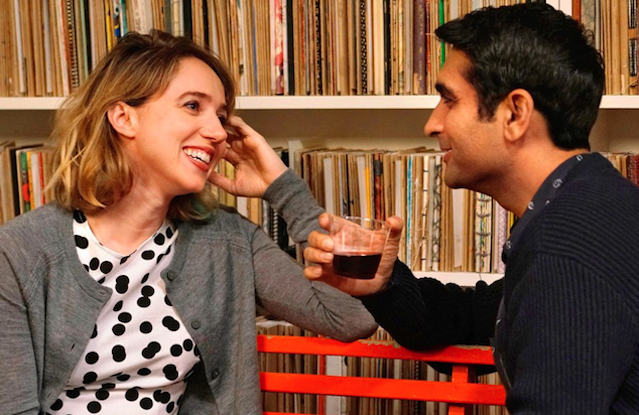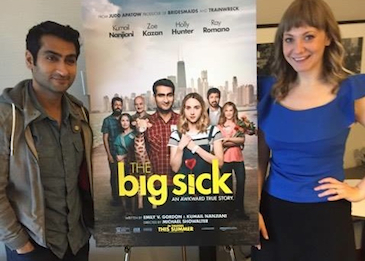CHICAGO – Patrick McDonald of HollywoodChicago.com appears on “The Morning Mess” with Dan Baker on WBGR-FM (Monroe, Wisconsin) on March 21st, 2024, reviewing the new streaming series “Manhunt” – based on the bestseller by James L. Swanson – currently streaming on Apple TV+.
Oscar Week: Kumail Nanjiani, Emily V. Gordon of ‘The Big Sick’
CHICAGO – One of the surprise hits of 2017 was a film based on a true life courtship incident, that the now husband and wife – Kumail Nanjiani and Emily V. Gordon – fashioned into a comedy. “The Big Sick” is nominated for Best Original Screenplay, and the duo behind it talked to HollywoodChicago.com last summer.
“The Big Sick” is about Chicago stand-up comedian Kumail (Nanjiani, portraying a version of himself) who encounters a heckler named Emily (Zoe Kazan). A relationship blossoms, even though it is against the traditions of his Americanized Pakistani family, who insist that Kumail must marry a Muslim woman… leading to Emily and Kumail breaking up. Against this background, Emily then gets seriously ill, falling into a coma. Kumail must re-connect with her while she is in this state, and deal with her parents Beth (Holly Hunter) and Terry (Ray Romano). The situation creates a more deeper understanding of relationship commitment and unity.

Zoe Kazan and Kumail Nanjiani of ‘The Big Sick’
Photo credit: Lionsgate
Kumail Nanjiani is best known as one half of the tech comedy team – with Martin Starr – on HBO’s popular TV series “Silicon Valley.” Born in Pakistan and raised in the United States, Nanjiani graduated from Grinnell College, and began his comedic career as a podcaster on “The Indoor Kids.” He also has had roles in “Adventure Time” (voiceover), “Franklin & Bash” and the film “Mike and Dave Need Wedding Dates.” His wife Emily V. Gordon is a writer for various publications, as well as the series “The Carmichael Show” and “The Meltdown with Jonah and Kumail.”
Both Patrick McDonald and Jon Lennon Espino of HollywoodChicago.com did a tag team interview during a Chicago promotional stop with co-writers/spouses Kumail and Emily V… split into transcripts and an audio clip below.
HollywoodChicago.com (Jon): Kumail, what was it like creating a character that was you and wasn’t you? And Emily, since it was a collaborative effort, how was it watching the film being produced, especially the coma scenes. Was there a connection or disconnection during the playing out of what happened to you?
Kumail Nanjiani: I’ll say it was interesting to look back at that point in my life and realize what I was like and what my problems were. Obviously the character in the film wasn’t completely me, but that guy had the same problems I did at that time in my life, especially in not thinking about the future and living day-to-day. There are certain things that are good about that attitude, but eventually I had to deal with what was coming up in the gfuture. So it was interesting to psychoanalyze myself from where I was back then, to give me insight to right now.
Emily V. Gordon: So much of the film happens while Emily is ‘taking a nap,’ it was good for me to go back and talk to my family and Kumail about it, whiling it was happened to me at the time. It was highly therapeutic and something I recommend to people in similar situations.
I think having the outsider’s perspective on something that happened to me from the ‘inside’ really helped in writing the script, even though I was there, but not there. Once I watched the actual film, I was so far removed from what happened that I was able to enjoy how it turned out.
HollywoodChicago.com (Patrick): Kumail, you emphasized your background as a Pakistani in the film, but your assimilation as an American. In your real life, what was the point of departure from being that kid from Pakistan to a person who maybe fits more comfortably in this country?
Nanjiani: I wouldn’t say I rejected one over the other. I don’t feel fully American and I don’t feel fully Pakistani. In fact, the definition of who is American is becoming narrower in recent years… and it excludes me. So I would say in real life, my goal right now is to forge an identity that combines both of those and is respectful to both of them, and not to reject either one. But it’s complicated, because in some ways they both identify themselves in defiance of the other.
Gordon: What is interesting about when Kumail and I first met, we both grew up watching the same movies and playing the same videogames, even though we were on opposite sides of the world. It’s a weird thing, but that bonded us. Entertainment culture ends up bonding a lot of us, but it was cool that while I was watching Indiana Jones in North Carolina, he was watching Indiana Jones in Pakistan. We both love Indiana Jones.
Nanjiani: That stuff does end up affecting other cultures, I’ve observed that it can dilute a native culture. I remember when MTV came to Pakistan, it changed society a little bit. The challenge for all the outside places is to form their own their own identities within the partaking of Western culture, because it’s so seductive.
Gordon: Well, in other countries at their McDonald’s there is always a menu item that coincides with the culture’s food.
Nanjiani: Oh, they have a local menu? Maybe that’s the best case scenario. All other countries are like the special menu items in a McDonald’s. [laughs]
HollywoodChicago.com (Jon): Kumail, to expand on that, how important was it for you to educate people about your culture and your family religion?
 Kumail & Emily V. in Chicago Photo credit: Patrick McDonald for HollywoodChicago.com |
Nanjiani: Our goal wasn’t to educate people, what we wanted to do was portray my family and my culture in a realistic way, in my experiences. We thought that would make a good movie. My family is a loving family, and the stakes are higher for a loving family… the character doesn’t want to lose them, and you understand that feeling. That was the goal, and the side effect of that is the audience can see a Muslim family that they don’t usually see in a film.
HollywoodChicago.com (Patrick): This is a point in the film where you are heckled with the usual ‘terrorist’ stereotype insult. What is the worst thing you’ve ever heard in that arena, either in your professional career or on the street, and how do your shield yourself emotionally when you experience such a slight?
Nanjiani: I heard exactly what happened in the film, except it was ‘Taliban motherf**ker’ instead of ISIS. It’s happened to me a number of times when I was on stage, and at first I didn’t know what to do because I was new to comedy.
It’s weird, because when someone was racist to me, even thought the problem is with them, I still felt smaller. I felt flattened, I felt that I was seen as this one thing, even though I’m a collection of many things. It’s jarring, and it hurt my feelings. Eventually I learned it’s them, not me, but it still made me feel small. It’s also embarrassing when I’m with a friend, and somebody is racist towards me. But I’ve learned to deal with it, and my hurt feelings don’t last as long any more. It just doesn’t stick with me anymore, because probably there is no more room in that particular spot in my consciousness.
In the audio portion of the interview, Jon and Patrick talk to Kumail and Emily V. about the collaborative writing process and a special and surprising potential ending episode for “Silicon Valley.”
 | By PATRICK McDONALD |


